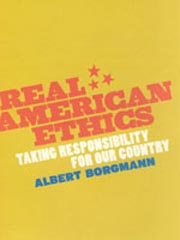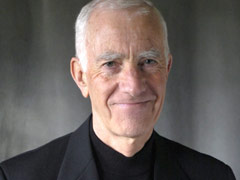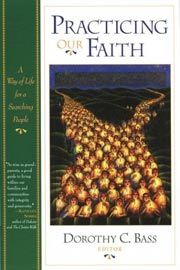In This Episode << SLIDE LEFT TO SEE ADDITIONAL SEGMENTS
How Should We Live?
by David E. Anderson
What is the good life? Is it dinner with the family, a walk in the woods, a baseball game at the local park?
More importantly, is there an ethic within the contemporary, technologically dominated culture of America that gets us to the good life?
These are the questions philosopher Albert Borgmann wrestles with in his most recent book, REAL AMERICAN ETHICS: TAKING RESPONSIBILITY FOR OUR COUNTRY (University of Chicago Press, 2006).
 His answer is yes, all of those occasions — dinner, walking, the shared festivity of a game — are part of the good life. But, he contends, it isn’t easy to get there from here in our consumption-oriented culture. Getting there will involve, first, the difficult but essential project of revealing the role technology and its fruits play in everyday life. Secondly, there must also be a willingness to abandon some of the habits made possible by technology in order to embrace some of the more burdensome activities from which technology has freed the affluent West. In particular, Borgmann wants to see a return to “focal” practices such as the family dinner and the creation of civic space that is given over to festival and celebration.
His answer is yes, all of those occasions — dinner, walking, the shared festivity of a game — are part of the good life. But, he contends, it isn’t easy to get there from here in our consumption-oriented culture. Getting there will involve, first, the difficult but essential project of revealing the role technology and its fruits play in everyday life. Secondly, there must also be a willingness to abandon some of the habits made possible by technology in order to embrace some of the more burdensome activities from which technology has freed the affluent West. In particular, Borgmann wants to see a return to “focal” practices such as the family dinner and the creation of civic space that is given over to festival and celebration.
Borgmann is one of the country’s subtlest thinkers about the impact of technology and consumption on American life. Putting technology in its place — that is, understanding it not only as a collection of devices such as televisions, computers, and microwaves but also as a culture, a way of life — has been Borgmann’s task in some half dozen books over nearly a quarter of a century, including POWER FAILURE (Brazos, 2003), which looks specifically at Christianity in the culture of technology and what resources it might deploy to resist technology’s attenuating impact.
In his new book, Borgmann says he wants to “come to philosophical terms” with America and draw “a moral portrait of how and what we are actually doing and what we could and should be doing.” America is a decent society, he says, but there is a hollowness at its center. America is important, he says, not just because he lives here (he teaches at the University of Montana in Missoula), but because it “is culturally the oldest sibling of the global family. It has been the first [country] since the late nineteenth century to move through the states of technological development and to experience their blessings and burdens.”
Is it possible, Borgmann asks, “to say something coherent and substantial about the norms and values that people in this country observe or ought to follow?”
He rehearses the influence of several approaches to ethics — theoretical, utilitarian, and practical — and the contribution of such thinkers as Thomas Jefferson, as well as the more recent work of Harvard public policy professor Robert Putnam and philosopher John Rawls, in shaping America’s ethical culture. Even architect Frank Lloyd Wright makes a significant appearance.
His touchstone, however, is Winston Churchill, and what he calls the Churchill Principle. In a 1941 speech to Parliament as it debated how to rebuild the House of Commons, destroyed by Germany’s aerial bombing, Churchill said, “We shape our buildings, and afterwards our buildings shape us.” Borgmann takes Churchill’s dictum and applies it not only to the physical, built environment, such as the decision to build the interstate highway system (whose effect, writes Borgmann, has been to induce driving and give us “an inconsequential experience of our world”), but also to the political, economic, and cultural environment.
Borgmann is no Luddite, nor is REAL AMERICAN ETHICS a shrill screed against all technological devices. He is not interested in indicting the American middle class and its technology-created and consumption-driven affluence. As he writes in POWER FAILURE, the reaction of the Christian to the rule of technology in everyday life “should not be reaction but restraint. Technology ought to be revoked as the dominant way of taking up with the world and relegated to securing the margins and underpinnings of our lives.” He celebrates, for example, medical technology for its ability to overcome sickness and disease, and fuel technology that creates a furnace providing warmth against the elements.
 Albert Borgmann |
But the dominance of technology has created a certain malaise, a vacuity at the center of American culture that results in a disconnectedness to real life brought about not only by the sheer quantity of commodities, but also by commodification — the process of removing things once thought “priceless” from their context, time, place, and community, and putting them into the marketplace where they are turned into commodities that can be purchased. “Today what we are typically in touch with are the machines of production and the commodities of consumption” rather than reality, Borgmann writes.
Contrary to both critics and defenders, for Borgmann technology is not an impartial tool. It stands under moral evaluation and ethical judgment:
The ways we are shaped by what we have built are neither neutral nor forcible, and since we have always assumed that public and common structures have to be one or the other, the intermediate force of our building has remained invisible to us, and that has allowed us to ignore the crucial point: We are always and already engaged in drawing the outlines of a common way of life, and we have to take responsibility for this fact and ask whether it is a good life, a decent life, or a lamentable life that we have outlined for ourselves.
One of the strengths of the book is Borgmann’s recognition that there isn’t a simple recipe or program to get to the good life. He dismisses programmatic reforms suggested by both the right and the left, although his sympathies are clearly with a liberal social reform agenda, even as he argues that it alone will not achieve the cultural transformation necessary for the good life. “The items on political agendas are too narrow to make a moral difference to ordinary middle-class life even if they were perfectly enacted. Prayer in schools would make us no more religious. Bans on gay marriage do nothing to strengthen families. Outlawing abortion would not make us care more deeply about the lives lost to disease and starvation,” he writes. Liberal reform programs such as a minimum annual income and universal health care are criticized because “we don’t know what their moral purpose is should they ever be enacted.”
Rather, the key is reappropriating “practices,” and the fundamental “practice” is gathering at the dinner table (“a focal point of rest and celebration”). Others include taking a hike, attending a game or concert, and communal celebrations and festivities such as going to church. Borgmann makes it clear that there is both a private, hearth-centered aspect to the good life, and a civic and public dimension.
Such practices — what might be called a “re-burdening” because they require taking on tasks that technology freed us from and that commodities do no require for their consumption — are the beginning of putting technology in its place and reconnecting with reality. Borgmann is not naïve enough to believe that “moral success” or what he calls “grace” will attend every family dinner. “We can be sure, however, if we never sit down to dinner, attend a game, or go on a hike … that grace will rarely descend on us.
“If, to the contrary, we are faithful in our practices, good things happen more often than not. To make room for grace in our lives, then, is a sensible prescription, though not a fail-safe recipe.”
 Borgmann’s discussion of practices will put some readers in mind of the Lilly Endowment-funded Practices of Faith book series, especially PRACTICING OUR FAITH (Jossey-Bass, 1998) edited by Dorothy C. Bass. In that volume, some dozen theologians and ethicists look at renewing a host of Christian practices, including Sabbath-keeping, hospitality, singing, and household economics. “Change touches us in our homes, workplaces, hospitals, and schools; it tests our relationships and shapes our desires, altering our sense of what we can expect from others and what we should expect of ourselves,” Bass and co-author Craig Dykstra write in the book’s opening chapter. “On the grand scale, change shows up in our major technological advances and global shifts in population. But in the end it reaches into the kitchens and bedrooms even of people who rarely travel and never use a computer… The basic activities of life are shifting all around us, and we are being pushed in directions we never intended to go.”
Borgmann’s discussion of practices will put some readers in mind of the Lilly Endowment-funded Practices of Faith book series, especially PRACTICING OUR FAITH (Jossey-Bass, 1998) edited by Dorothy C. Bass. In that volume, some dozen theologians and ethicists look at renewing a host of Christian practices, including Sabbath-keeping, hospitality, singing, and household economics. “Change touches us in our homes, workplaces, hospitals, and schools; it tests our relationships and shapes our desires, altering our sense of what we can expect from others and what we should expect of ourselves,” Bass and co-author Craig Dykstra write in the book’s opening chapter. “On the grand scale, change shows up in our major technological advances and global shifts in population. But in the end it reaches into the kitchens and bedrooms even of people who rarely travel and never use a computer… The basic activities of life are shifting all around us, and we are being pushed in directions we never intended to go.”
In POWER FAILURE, too, Borgmann connects his idea of the “re-burdening” of activity, of “counter-practice” specifically within Christian tradition, especially the lives of the Desert Fathers.
He argues that while technology will continue to dominate everyday life, the Christian should seek to relegate technology “to securing the margins and underpinnings of our lives.” He calls for a “radical theology” of technology and invokes the practices of ascetic tradition and early monastic communities: “The passage through technology discloses a new or an ancient splendor in ascesis. There is no duress or denial in ascetic Christianity. On the contrary, liberating us from the indolence and shallowness of technology, it opens to us the restive engagement with life.”
In looking at the public dimension of the good life, Borgmann argues that the “region of American society where a sense of real ethics is alive is the one where human welfare, nature, and art are held sacred and where the claims and lessons of history are honored.” Again, he eschews the liberal-conservative polarity to argue the country is much less divided than pundits and politicized commentators would have us think, although the conventional divides are sometimes made so prominent they obscure the places where “real ethics” may thrive.
Borgmann finds some energetic social movements contributing to restoring the good life. They include the new urbanism and its stress on densely settled neighborhoods with farmers’ markets, street musicians, and a city fabric that invites walking; environmentalism that “in its loftier aspirations” seeks to make people get in touch with mountains and rivers; and the “voluntary simplicity” movement. But because these reform efforts are dispersed, their effect on politics and society is weak, he argues.
Christians and non-Christians alike might have trouble with Borgmann’s brief and sketchy prescription for renewing the public square and its sense of celebration and festivity, especially as he outlines it in POWER FAILURE. There he argues that without tax support, genuine communities of celebration are impossible: “Public support is needed, for without it communal celebrations will founder on the shoals of marginality, injustice and instability.” He seems to feel that the celebration of national holidays do not touch the deeper aspirations of the people and have become emptied of their significance. His solution, however, is to lower the wall of separation between church and state so that publicly supported religious celebrations, which, presumably, do embody the deeper aspirations of people, have their place in the public square.
Borgmann is aware of the complexity of the issues and the liberal fear of religious intolerance, but he cites a statement by the Italian Roman Catholic bishops arguing that the Catholic liturgy should be seen “as a cultural event.” He adds, “And mindful of the religious diversity in the United States, we should invite our Jewish and Muslim friends and all religious people of goodwill to do likewise.”
He does not come back to that idea in REAL AMERICAN ETHICS. Instead, he returns to the centrality of the dinner table, where he says it is possible to become broadly familiar with the width and depth of American culture. “Whatever grace and friendship come from that realization, there needs to be the wider recognition of the economic and military power that has been generated by American culture, and there has to an acceptance of the moral obligations that follow from power,” he writes, adding in an especially insightful and provocation remark, “Although the celebration of dinner should be wholehearted, it cannot be unreserved. Celebration has to imply the determination to widen the circle of well-being until it includes everyone in this country and on earth.”
REAL AMERICAN ETHICS is a salutary and important work. It reveals the often invisible structures of the culture we have constructed, and it points the way to holding some of its forces at bay.
David E. Anderson has also written for Religion & Ethics NewsWeekly on novelist Marilynne Robinson and singer Bob Dylan.







